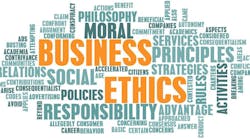Can a Strong Ethical Culture Affect Workplace Performance?
While linking an ethical culture to how a company’s workforce performs might not be obvious, a recent study, Benchmark of Ethical Culture, by LRN found this correlation matches up.
The report, which surveyed 8,000 employees across 17 industries, found that companies with the strongest ethical cultures outperform others by 40% across a number of business metrics including levels of customer satisfaction, employee loyalty, innovation, adaptability and growth.
Types of Misconduct
Looking specifically at the manufacturing sector, one in three employees observed misconduct. It’s slightly less than other industries, but still a high number. The types of misconduct include:
- Conflict of interest – 12%
- Employee health and safety – 10%
- Harassment & discrimination –9%
- Environment health and safety – 7%
- Retaliation or intimidation – 5%
Interestingly, there was a difference in how certain sectors of a manufacturing company viewed this topic. For example, 74% of corporate employees in the manufacturing space would be comfortable reporting unethical behavior to a manager while only 57% of production employees felt comfortable. In addition to reporting, production employees feel more pressure to achieve short-term objectives, even if it means acting unethically.
Reporting Misconduct
In the study of the 81% who reported misconduct, they reported their concerns to various people in the organization.
- Immediate manager 59%
- Another manager 24%
- Human resources 24%
- Legal 15%
- Ombudsman 8%
Of those that didn’t report the reasons were varied:
- I feared retaliation (52%)
- I didn’t think my company would do anything about my concern (38%)
- The person involved was very senior and I was afraid to report (35%)
- I don’t trust that my concern would be kept confidential (31%)
- I don’t think my manager would know how to deal effectively with my concern ( 21%)
However, the news isn’t all bad with some specific areas of cultural strength. Companies scored high in program resonance, DEI and transparency.
Taking Culture Temperature
People holding corporate positions were asked about specific behaviors, and the following statements scored high:
- People seek guidance if they’re not sure of the right thing to do ( 81% agree)
- People in my company would speak out if they saw something unethical ( 79% agree)
- Our company values guide people’ behavior ( 79% agree)
People holding production roles were asked about specific behavior, and the following statements scored high:
- I would speak out if I saw or suspected misconduct occurring ( 74% agree)
- People in my company would speak out if they saw something unethical (71% agree)
- People seek guidance if they are unsure of the right thing to do (71% agree).
Given these varying responses and the importance of making sure that a company’s ethical culture is at an optimal level, the report suggests companies determine whether or not they can answer the following questions.
- Do we truly understand what is driving and influencing the behavior that we are seeing?
- Do we know how our employees are experiencing our culture, and how that might vary across the organization?
- Do we know how employee, leadership, and organizational behavior are impacting our business performance?
- Are we going through a period of significant change in strategy, leadership, or organizationally?
